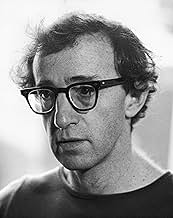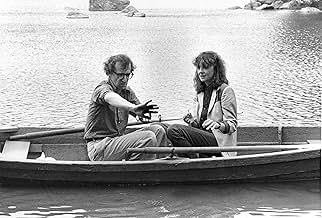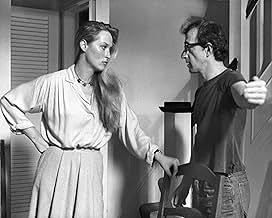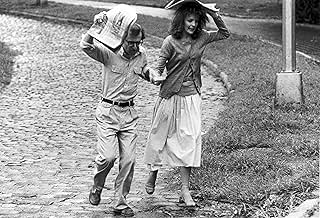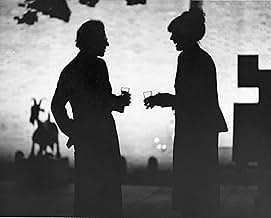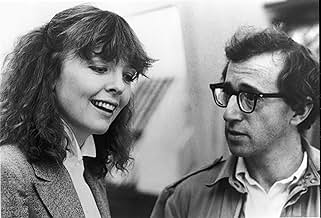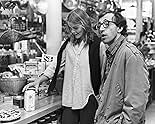Das Leben eines geschiedenen Fernsehautors, der eine Beziehung zu einer Teenagerin hat, wird noch komplizierter, als er sich in die Geliebte seines besten Freundes verliebt.Das Leben eines geschiedenen Fernsehautors, der eine Beziehung zu einer Teenagerin hat, wird noch komplizierter, als er sich in die Geliebte seines besten Freundes verliebt.Das Leben eines geschiedenen Fernsehautors, der eine Beziehung zu einer Teenagerin hat, wird noch komplizierter, als er sich in die Geliebte seines besten Freundes verliebt.
- Für 2 Oscars nominiert
- 16 Gewinne & 24 Nominierungen insgesamt
- Emily
- (as Anne Byrne)
Handlung
WUSSTEST DU SCHON:
- WissenswertesThere is allegedly a clause in the studio's contract for the film that mandates that the movie must always be shown in letterbox format in any home video release and/or TV/cable broadcast.
- PatzerWhen Isaac asks Tracy how old he will be when she is thirty-six, she says "sixty-three," and he agrees. Earlier Isaac says that she is seventeen and he is forty-two, which means he is 25 years older than her, and would therefore be sixty-one, not sixty-three.
- Zitate
Isaac Davis: All the times I come over here, I can't understand how you can prefer her to me.
Jill: You can't understand that?
Isaac Davis: No. It's a mystery to me.
Jill: Well, you knew my history when you married me.
Isaac Davis: I know. My analyst warned me, but you were so beautiful that I got another analyst.
- Crazy CreditsOne of the very few Woody Allen films to not have traditional opening credits, save the production company bumper (United Artists), and the film title MANHATTAN is seen as a long vertical flashing bright neon sign, located on the side of a New York City building, and is seen for under seven seconds just before Woody Allen narrates his first line.
- VerbindungenEdited into Intimate Portrait: Diane Keaton (2001)
- SoundtracksRhapsody in Blue
(1924)
Music by George Gershwin
Performed by The New York Philharmonic
Conducted by Zubin Mehta
Piano soloist: Paul Jacobs
Music director: Zubin Mehta
If this all seems very confusing to you, then you're not alone. Just as in 'Annie Hall,' Allen plays the hopeless romantic who is struggling desperately to understand the maddening complexity of human relationships. Though Tracy is only seventeen years old, she is arguably the most honest and mature of the women in Isaac's life; nonetheless, he doesn't treat her seriously. In his mind, anything that she says is quite obviously influenced by the naivety and downright ignorance of the young. Their relationship was never meant to be anything more than a brief "fling," and so he feels no guilt for seeing another woman behind his back, an act that makes him livid when it ultimately happens to him.
'Manhattan' was shot in beautiful crisp black-and-white by Gordon Willis, who has also worked on, among countless other films, 'Annie Hall' and the three installments of 'The Godfather.' The cinematography offers New York City a romantic 1940s feel, reminiscent of how Allen claims to remember the city as a child: "Maybe it's a reminiscence from old photographs, films, books and all that. But that's how I remember New York. I always heard Gershwin music with it, too. In 'Manhattan' I really think that we that's me and cinematographer Gordon Willis succeeded in showing the city. When you see it there on that big screen it's really decadent."
Mysteriously, this film remains the least-liked by the director himself, though, at the same time, it was also his most commercially successful. As you've no doubt already noticed from this review, 'Manhattan' is often likened to 1977's 'Annie Hall,' perhaps due to the repeated casting of Allen and Keaton (a not uncommon occurrence) or its similar attempt to uncover the elusive secrets behind love and relationships. In terms of film-making style, however, the films are quite dissimilar. Unlike the highly-energetic 'Annie Hall' which cut back and forward in time, visited old memories, broke the fourth wall and made conversations with passing extras 'Manhattan' boasts a more classical approach quiet, softly-spoken and accompanied by a wistfully slow jazzy soundtrack, also relying heavily on the works of George Gershwin.
Top-Auswahl
Details
- Erscheinungsdatum
- Herkunftsland
- Sprache
- Auch bekannt als
- Chuyện Tình Manhattan
- Drehorte
- Produktionsfirma
- Weitere beteiligte Unternehmen bei IMDbPro anzeigen
Box Office
- Budget
- 9.000.000 $ (geschätzt)
- Bruttoertrag in den USA und Kanada
- 39.946.780 $
- Eröffnungswochenende in den USA und in Kanada
- 485.734 $
- 29. Apr. 1979
- Weltweiter Bruttoertrag
- 40.194.067 $
- Laufzeit1 Stunde 36 Minuten
- Farbe
- Sound-Mix
- Seitenverhältnis
- 2.39 : 1
Zu dieser Seite beitragen



